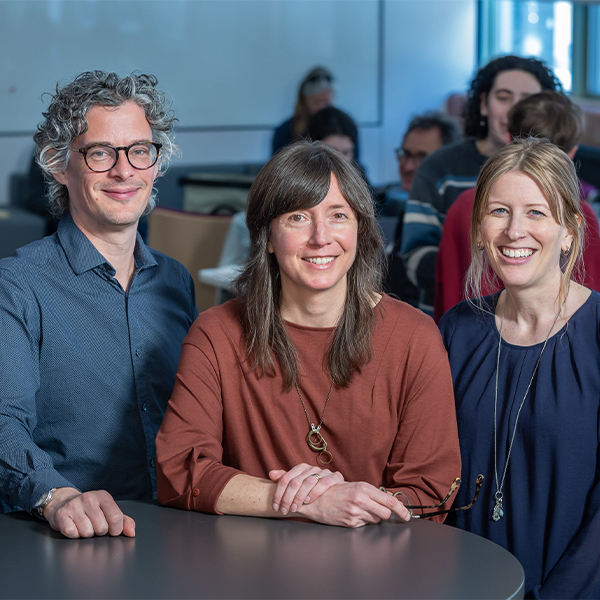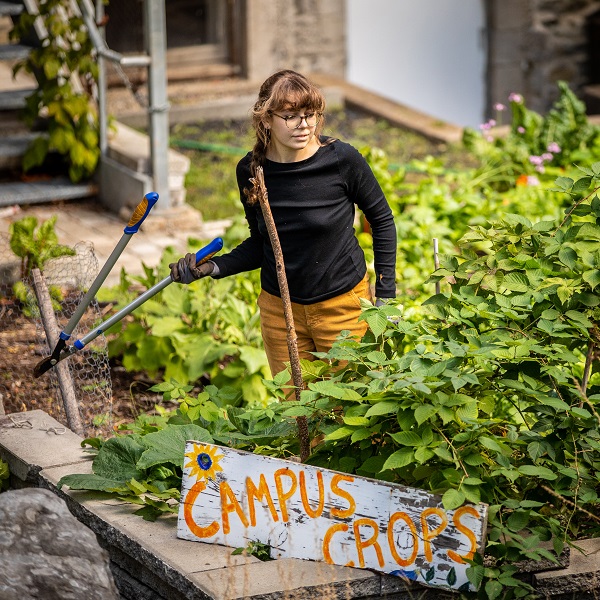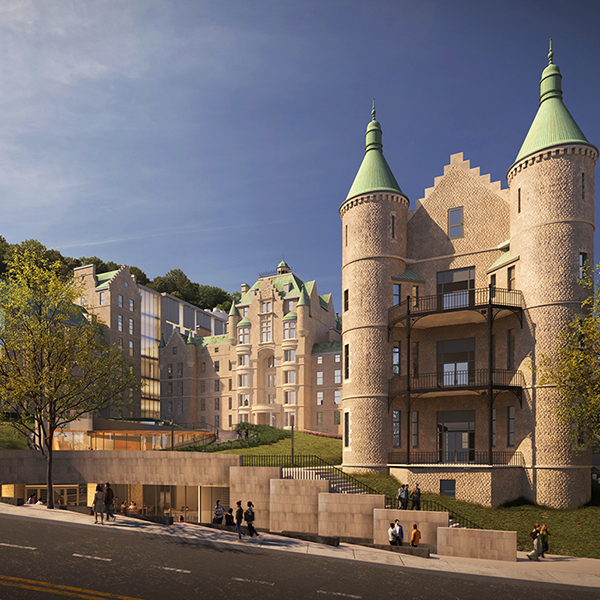If you haven’t visited McGill’s downtown campus in a few years, you might notice some changes. The most obvious as you approach: no cars. If you are wandering about in a warmer month, you’ll spot herbs and vegetables growing in a variety of spots.
Single-use plastic bottles are now banned and 20 water fountains (plus another five at Macdonald Campus) have either been retrofitted or added to make it easier for you to fill up your reusable bottle. You can now go for a restorative stationary spin at one of four Spin Bike Gardens. And McGill’s cafeterias now include plenty of fresh options on the menu featuring food that comes from a very familiar place – Macdonald Campus.
Many of these changes were sparked by McGill’s Sustainability Projects Fund (SPF), an initiative that recently marked its 10th anniversary.
A unique program that is jointly funded by the University and its students, it’s the largest fund of its kind in the country. Students contribute 55 cents per credit to the fund and the University matches that amount dollar-for-dollar.
More than 200 projects have been funded so far. Projects have ranged from a Green Labs Initiative at the Montreal Neurological Institute, to a new hiking trail at McGill’s Gault Nature Reserve in Mont-Saint-Hilaire. McGill Feeding McGill is probably the single project that has had the most impact. Macdonald Campus now supplies 15,600 kilos of produce, 3,000 kilos of beef, and 104,000 eggs a year to the McGill community.
“It’s really a partnership in funding and decision making” between McGill and its students, says François Miller, the director of the McGill Office of Sustainability. And the fund played a major role in the University winning an international award earlier this year for its sustainability efforts.
McGill was named Sustainability Institution of the Year at the 2019 International Green Gown Awards (the winners were named in New York in July as part of the United Nations High Level Political Forum).
Miller says sustainability is now a part of the DNA of McGill governance. Since 2017, sustainability initiatives and accomplishments are part of the regular reports to McGill’s Board of Governors, along with the usual key performance indicators, like student enrollment.
There is still plenty of work to do, says Miller. McGill’s Climate and Sustainability Action Plan, which was adopted in 2017, laid out an ambitious roadmap. The University plans to go completely carbon neutral by 2040. McGill’s sustainability efforts so far have earned a gold rating from the Association for the Advancement of Sustainability in Higher Education. McGill plans to earn a platinum rating by 2030.
“There are a ton of criteria,” says Miller of aiming for platinum. “From what we teach, the research that’s being produced, the food we serve in the cafeterias, the cleaning products [we use]. It’s a complete photograph of how we deal with sustainability as an institution.”
Miller encourages McGill community members to plan their events with sustainability in mind. His office supports the McGill Sustainable Events program, which provides consultations and resources aimed at reducing environmental impacts while promoting inclusivity and accessibility.
The University’s convocation ceremonies earned a gold certification from the McGill Sustainable Events team this year – the biggest event yet to attain that level.
Miller is particularly proud of the single-use plastic bottle ban, which represents 85,000 bottles per year. It took planning and coordination with a variety of units across two campuses, from Food and Dining Services to McGill Athletics.
Miller is full of praise for the staff in his office. “We have a great team of people who understand how to navigate within a complex system, and enact change,” he says. “The common thread is they all approach sustainability really professionally and with passion.”
Miller has also assembled an advisory council on sustainability. The council has six external members who bring in expertise from different fields, including Lauren Rathmell, BSc’10, one of the founding members of Lufa Farms, and Alan DeSousa, BCom’81, DPA’82, the mayor of Saint-Laurent.
The 2040 carbon neutral goal will be challenging. Not only is McGill striving to reduce the carbon emissions of its direct activities, as are many schools, but McGill will also count the greenhouse gas produced by indirect emissions, like commuting to and from the University.
For help with this, the SPF has put aside nearly $250,000 to replace McGill’s current vehicles with electric models. As the old cars need to be retired, the fund will cover the price difference for more environmentally friendly ones.
The office is also encouraging people to reduce the emission impact of air travel to and from conferences, and launched the campaign, “Because I didn’t fly.” A group from the lab of associate professor of natural resource sciences Elena Bennett decided to drive together in a van to an event in Georgia, camping and bonding along the way while reducing their carbon footprint.
Though the first priority is to reduce emissions, Miller says, another is for better carbon sequestration through land and forest management at the University’s farm and reserves. McGill will also be purchasing carbon offset credits, making up for some of its unavoidable carbon use.
It won’t be easy, but Miller believes that McGill can pull it off. “Aiming to achieve carbon neutrality by 2040 is a clear example of an alignment between our aspirations, our commitments and the science we produce.”


